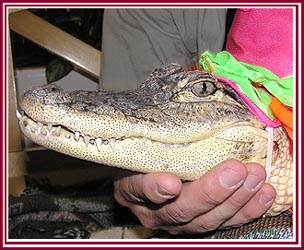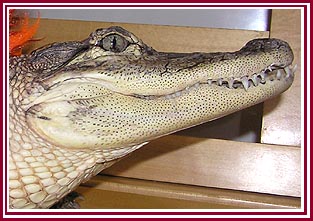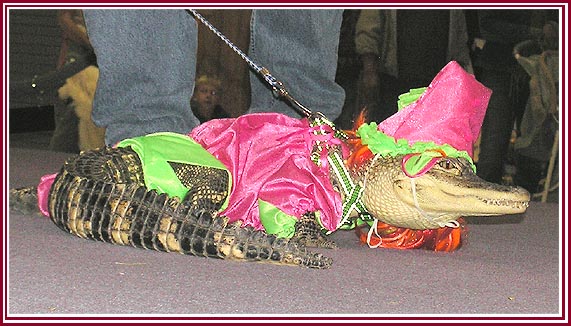|
|
|
|
|
|
AB 333/SB 241, TO REGULATE OWNERSHIP
OF EXOTIC PETS, DEAD FOR THIS SESSION
Updated 21 March 2016
|
|
|
|
| |
NOTE: AB 333/ SB 241 IS
DEAD FOR THIS WI STATE LEGISLATIVE SESSION. It passed out of committee in the
Senate but failed to advance, leaving Wisconsin still one of five states with
little to no regulation of exotic species.
We will
try again next legislative session.
|
On 20 January 2016, Sen.
Wanggaard introduced an amendement to SB 241 similar to LRBa0786/P2 (link
below), which in effect would exempt USDA license holders and ZAA members from
the bill, as well as removing the ban on public contact. The new amendment
would ALSO remove crocodillians from the list of prohibited animals. (Read Senate Amendment 1 here). The Assembly Committee on
Consumer Protection is considering a similar amendment similar amendment. These
amendments significantly WEAKEN this legislation!
The
WI Senate Committee on Judiciary and Public Safety will be
voting on this bill on 27 January. PLEASE contact Committee members (see below), particularly if you are one of their
constituents, and request them to pass AB 333/ SB 241 out of their respective
committees AS WRITTEN, without these amendments!
 Senate Amendment 1 Senate Amendment 1 
 LRBa0786/P2, Proposed Amendment to
SB 241 LRBa0786/P2, Proposed Amendment to
SB 241 
 Find your WI State
Representatives Find your WI State
Representatives 
|
Why We
Object to the Proposed Amendments:
The proposed amendment to AB
333, similar to the proposed LRBa0786/P2 to SB 241, would defeat the
bill’s purpose by adding unacceptable exemptions for Zoological
Association of America (ZAA) members and U.S. Department of Agriculture (USDA)-
licensed facilities, while removing an important prohibition on public contact
with animals such as tigers, lions, bears, and chimpanzees! (See below for AB 333/ SB 241 history, summary, fiscal estimate,
and talking points).
USDA
EXEMPTION: Exempting USDA licensees severely weakens AB 333/ SB 241 and
essentially renders the bills ineffective. Even the
federal government acknowledges that state exotic pets laws which exempt USDA
licensees provide a loophole for pet owners as these licenses are easily
obtained but difficult for the agency to revoke. Licenses are
automatically renewed every year, even when a licensee has had serious and/or
repeated AWA violations. Quite aside from that, we know from experience with
the Dog Seller Law that USDA minimum standards of care, though better than
nothing, are still woefully inadequate from the humane standpoint. And the USDA
still only has 126 inspectors for more than 10,433 licensed facilities!
The HSUS has proposed an alternative amendment
that would essentially grandfather all existing USDA licensees that currently
exhibit dangerous exotic species. This would mitigate opposition to SB 241 by a
number of private owners and organizations that testified at the senate
committee hearing.
ZAA
EXEMPTION: The deceptively-named Zoological Association of America (ZAA)
has NO affiliation with the highly respected Association of Zoos and Aquariums
(AZA). The ZAA's weak standards promote the private ownership of exotic pets
and poorly run roadside zoos, traveling zoos, and private menagerie. Despite
threats to public safety and animal welfare, ZAA standards allow public contact
with dangerous wild animals, including 90-pound bears, tiger and lion cubs, and
chimpanzees and orangutans. ZAA’s vague and inadequate accreditation
standards allow conditions that were common at zoos 30 or 40 years ago, but
which are totally inconsistent with modern animal care practices.Attempts to exempt ZAA facilities from state dangerous wild
animal laws were defeated in California, Louisiana, Michigan, Texas, and Clark
County, Nevada. We can and must defeat them here in
Wisconsin, also!
NO
PUBLIC CONTACT BAN: Allowing public contact with dangerous wild animals
is unsafe for the public, harmful to animals, and leads to excessive breeding
of animals such as tigers to ensure a steady supply of cubs are available for
petting, handling, and photo sessions. States that allow public contact with
animals such as tigers typically have higher captive populations of these
animals due to constant breeding, which increases the risk of attacks and
escapes and puts first responders in grave danger. This activity, which is
opposed by experts, also results in malnourished, unhealthy animals who are
subjected to stress, maternal deprivation, and physical abuse.
 LRBa0786/P2, Proposed Amendment to SB
241 LRBa0786/P2, Proposed Amendment to SB
241 
 Fact Sheet on Proposed Amendment LRBa0786/P2 to SB 241
(pdf) Fact Sheet on Proposed Amendment LRBa0786/P2 to SB 241
(pdf) 
PLEASE respectfully request committee members to REJECT draft
amendment LRBa0786/P2 and its Assembly counterpart and SUPPORT SB 241/ AB 333
as introduced, especially if you are among their constituents!
 Committee on Consumer Protection Committee on Consumer Protection 
 Committee on Judiciary and Public
Safety Committee on Judiciary and Public
Safety 
|
| |
|
 Summary of
SB 241/AB 333 Summary of
SB 241/AB 333  Full
Bill Text Full
Bill Text  Fiscal Estimate (PDF) Fiscal Estimate (PDF) 
 SB
241 Bill History SB
241 Bill History  AB 333 Bill History AB 333 Bill History  Talking Points Talking Points 
 LRBa0786/P2, Proposed Amendment to SB
241 LRBa0786/P2, Proposed Amendment to SB
241 
 Fact Sheet on the need for
Exotic Animal Regulation (pdf) Fact Sheet on the need for
Exotic Animal Regulation (pdf) 
 Fact Sheet on Proposed Amendment LRBa0786/P2 to SB 241
(pdf) Fact Sheet on Proposed Amendment LRBa0786/P2 to SB 241
(pdf) 
|
| |
 Lions and tigers and bears, in
Wisconsin? Oh MY! Also, chimpanzees, alligators, crocodiles, and many
other types of non- native wildlife that should NOT be kept as pets -- but are.
No matter how cute and cuddly and friendly the animals seem, these so-called
"exotics" are still WILD animals. Keeping them as pets may cause not
only a hardship for the animals, but also a potential danger to owners and
unsuspecting WI citizens. Lions and tigers and bears, in
Wisconsin? Oh MY! Also, chimpanzees, alligators, crocodiles, and many
other types of non- native wildlife that should NOT be kept as pets -- but are.
No matter how cute and cuddly and friendly the animals seem, these so-called
"exotics" are still WILD animals. Keeping them as pets may cause not
only a hardship for the animals, but also a potential danger to owners and
unsuspecting WI citizens.
Senator Van Wanggaard, representing Wisconsin's 21st Senate District, has
authored a bill to restrict the private possession of dangerous non-native
("exotic") wild animal species in Wisconsin.
SB 241
was introduced into the Wisconsin State Legislature on 26 August 2015 by
Senators Wanggaard, Risser, Miller, Lassa and C. Larson; and cosponsored by
Representatives Kerkman, Edming, Spiros, Kremer, Stuck, Novak, Subeck, Sinicki,
Spreitzer, Thiesfeldt, Murphy, Ohnstad, Hintz, Genrich, A. Ott and Kitchens.
(Representative Heaton was added as a cosponsor on 9/9/2015.) It was read the
first time and referred to
Committee on Judiciary and Public Safety.
 Summary of
SB 241 Summary of
SB 241  Full Bill Text Full Bill Text 
 Committee on Judiciary and Public
Safety Committee on Judiciary and Public
Safety 
A
"companion bill," AB 333, was introduced into the Wisconsin State
Assembly on 10 September 2015 by Representatives Kerkman, Edming, Spiros,
Kremer, Stuck, Novak, Subeck, Sinicki, Spreitzer, Thiesfeldt, Murphy, Ohnstad,
Hintz, Genrich, A. Ott, Kitchens, Brandtjen and Heaton; and cosponsored by
Senators Wanggaard, Risser, Miller, Lassa and C. Larson. It was read the first
time and referred to
Committee on Consumer Protection.
 Summary of
SB 241/AB 333 Summary of
SB 241/AB 333  Full Bill Text, AB 333 Full Bill Text, AB 333 
 Committee on Consumer Protection Committee on Consumer Protection 
Please contact your WISCONSIN state representatives (see link below to
find your WI
representatives ). Ask them to SUPPORT SB 241/
AB 333, which make changes to the laws relating to the possession of certain
wild animals and thus will regulate the ownership of non-native or
"exotic" wild animals as pets. (Read the entire bill (pdf))
Try
to keep your message brief, and be sure to give your name, address, and phone
number. Please, ALWAYS be polite and respectful. Name-calling, and rude or
abusive letters or emails will hurt, rather than help, our cause.
 Find your WI State
Representatives Find your WI State
Representatives 
 Summary of
SB 241/AB 333 Summary of
SB 241/AB 333  Full
Bill Text Full
Bill Text  Fiscal Estimate (PDF) Fiscal Estimate (PDF) 
 SB
241 Bill History SB
241 Bill History  AB 333 Bill History AB 333 Bill History  Talking Points Talking Points 
|
| |
Top
|
| |
Talking
Points:
According to the
sponsorship memo curculated by Sen. Wanggaard:
"Currently,
Wisconsin is one of only five states that does not have a state law regulating
the private possession of dangerous wild animals. Individuals can possess these
dangerous animals often at the expense of taxpayers. Police, animal control,
and other emergency personnel that respond in such cases are forced to utilize
their already limited resources. These animals pose a significant threat to the
safety of Wisconsin residents.
"Unfortunately
the current incident [of a possible lion at large] in Milwaukee is just one of
many dangerous instances that have occurred in Wisconsin. Recently in Kenosha,
law enforcement were called to a scene and eventually removed five
rattlesnakes, a crocodile, two alligators, and a poisonous gila monster from a
house.
Under the bill,
private possession, sale, and propagation of exotic animals including lions,
tigers, . . . brown bears, . . . chimpanzees, alligators, and crocodiles is
prohibited. People who currently possess these
species can keep them until the animals die [emphasis added],
but they will not be allowed to acquire additional dangerous exotic animals.
Certain zoos, veterinarians, and other reasonable institutions are also exempt
from this prohibition.
"This is
common sense legislation that will keep citizens, law enforcement, and
emergency responders safe. It has received widespread support from a coalition
comprised of: Wisconsin Professional Police Association, League of Wisconsin
Municipalities, Wisconsin Realtors Association, Wisconsin Animal Control
Association, Wisconsin Federated Humane Societies, and Association of Zoos and
Aquariums."
Wisconsin is one of
only five states in the country that does not regulate or requre licensing for
the possession of certain wild animals.
These animals have
very specific needs for food, housing, exercise, and veterinary care that few
citizens can adequately provide. Many are kept in inhumane and abusive
conditions and suffer needlessly though lack of proper care.
Wild animals can be dangerous. They are not
pets.
While adorable and appealining when young,
these species grow to be unmanageable for most people and often endup
abandoned, released, or "warehoused" in substandard facilities.
The release or escape of wild animals is a
danger and burden on law enforcement and to humane organizations.
Humane societies and animal shelters in
Wisconsin do not have the resources to care for these types of animals when
they become homeless, abandoned, or escape.
|
| |
Top
|
| |
SB
241 / AB 333 Analysis by the Legislative Reference Bureau
(Note: Emphasis is
ours)
 This bill makes changes to the laws
relating to the possession of certain wild animals. This bill makes changes to the laws
relating to the possession of certain wild animals.
Under
current law, known as the captive wildlife law, the Department of Natural
Resources (DNR) regulates the possession of, and other activities related to,
certain wild animals. Generally under current law, a person may not possess a
wild animal that is native to Wisconsin without a license from DNR. There are
exceptions to this prohibition for some animals, including chipmunks, mice,
pigeons, and voles. Certain entities may possess wild animals without a license
from DNR, including veterinarians, zoos accredited by the Association of Zoos
and Aquariums, municipal zoos, and circuses.
Generally, the captive
wildlife law does not require a person to have a license from DNR to possess a
wild animal that is not native to Wisconsin, such as a lion, unless the animal
is endangered or threatened and native to the United States or Canada or is a
harmful wild animal. Under the statutes, cougars, wild and feral swine, and
bears, including nonnative bears, are harmful wild animals. The law authorizes
DNR to designate other wild animals that satisfy specified criteria as harmful
wild animals. DNR has designated mute swans and wolf-dog hybrids as harmful
wild animals. Generally, a person may not possess, exhibit, propagate, sell, or
purchase a harmful wild animal without specific authorization in a license
issued by DNR.
The
captive wildlife law also authorizes a city, village, town, or county to enact
an ordinance that prohibits the possession of wild animals.
This bill generally prohibits the possession, propagation, and
sale of dangerous exotic animals. Under the bill, dangerous
exotic animals are nonnative big cats, including lions and tigers;
nonnative bears, including brown bears and polar bears; apes, including
gorillas, chimpanzees, and gibbons; and crocodilians, including alligators,
crocodiles, and caimans. Certain entities are exempt from the prohibitions,
including veterinarians, accredited zoos, municipal zoos, circuses, federally
licensed research facilities, and wildlife sanctuaries. The bill authorizes a person who does not qualify for an
exemption but who owns a dangerous exotic animal when the bill takes effect to
continue to possess the animal if the person registers the animal with the
municipality in which the person keeps the animal.
The
bill prohibits a person from allowing a member of the public to come into
direct contact with a dangerous exotic animal and requires the owner of a
dangerous exotic animal to inform local law enforcement if the animal escapes.
The bill also authorizes a city, village, town, or county to enact an ordinance
relating to dangerous exotic animals if the ordinance is at least as strict as
the provisions in the bill relating to dangerous exotic animals.
In
addition, the bill eliminates DNR’s authority, under the captive wildlife
law, to regulate dangerous exotic animals, including nonnative bears, as
harmful wild animals.
 Read the entire bill (pdf) Read the entire bill (pdf) 
|
|
| |
|
 Summary of
SB 241/AB 333 Summary of
SB 241/AB 333  Full
Bill Text Full
Bill Text  Fiscal Estimate (PDF) Fiscal Estimate (PDF) 
 SB
241 Bill History SB
241 Bill History  AB 333 Bill History AB 333 Bill History  Talking Points Talking Points 
 Find your WI State
Representatives Find your WI State
Representatives 
|
| |

We appreciate
that there are some people who consider their "exotic" pets as one of
the family, just as dog or cat owners do. Under Sen. Wanggaard's bill, they
would be allowed to keep their pets.
Even responsible
owners of "exotics," however, must acknowledge that these wild
animals may pose a danger to other animals and to humans, and take precautions
to protect the "exotic," other household pets, their family members,
and anyone else who might come in contact with the "exotic."
|
| |
Top
|
|
|
|
|
|
|
WPMP
Home * What Is A Puppy Mill?
What Can I Do About
It? * Laws/Legislation
|
|
|
|
|
©
Copyright, 2015. The Wisconsin Puppy MIll Project
P.O. Box 926 * Sheboygan, WI
53082-0926 * info@NoWisconsinPuppyMills.com
Alligator photos
Copyright © 2005, Pat Crean/
Flying Spots
Photography, and used by permission.
Website design by
Hook & Web
Designs
|
|